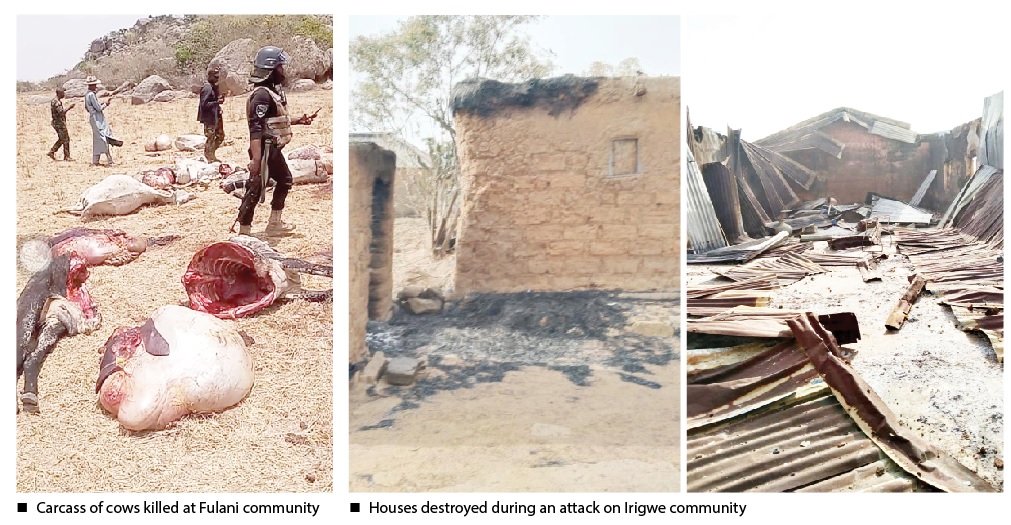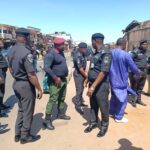It appears there is no end soon to the conflict between Fulani and Irigwe ethnic groups in the villages of Bassa Local Government Area of Plateau State, following the escalation of skirmishes between the two sides which continue to claim lives and properties, despite several efforts by different stakeholders to broker peace in the area.
Last Sunday, more than 12 people were killed in separate attacks in Cando Zrreci and Ritivo villages of the LGA, while they were observing an annual festival.
- Train attack: We won’t rest until we rescue kidnapped victims – FG
- Why APC won’t survive in Kwara beyond 2023 – Tajudeen Audu
Prior to the recent crisis, Bassa LGA was considered the most peaceful in the state where even the 2001 violence that erupted in Jos didn’t spread to despite its closeness to the volatile Jos North.
The 10-year tit-for-tat conflict has claimed hundreds of lives in the area. Farm crops worth millions of naira have been destroyed while hundreds of livestock were killed. Thousands of people have been displaced as a result of the incessant attacks.
In the last two weeks alone, more than 20 people were killed in several attacks on the villages of Bassa and Jos South LGAs, and tension is heightening by the day.
While confirming the last attack on Cando Zrreci and Ritivo villages, where 12 people were killed, the spokesman of Operation Safe Haven, a multi-security taskforce maintaining peace in the state and some parts of Bauchi and Kaduna states, Major Ishaku Takwa, said “of recent, our troops have been battling with a lot of criminalities in that general area ranging from attacks on unsuspected citizens, attacks on herders and villages, killing and poisoning of cows. We are strategising to ensure lasting peace in the area.”
The many efforts being put in place to end the attacks seem not to be yielding positive results as reports of killings and counter killings in villages of Bassa LGA persist with innocent lives, including women being killed and both parties often blaming the other.
The recent killings, however, are coming after the warring parties have signed different peace pacts which were about to be implemented.
Soon after the August crisis, last year, various peace meetings at different instances were organised by both Governor Simon Bako Lalong and the General Officer Commanding 3 Division of the Nigerian Army, Major General Ibrahim Ali, who doubles as the commander of Operation Safe Haven (OPSH), to broker peace between the warring parties.
Stakeholders say lack of sincerity on the side of the warring parties, non-prosecution or delay in prosecution of offenders by courts are among the reasons for the continued killings in Bassa.
Dr. Prince Charles Dickson, Team Lead, Tattaunawa Roundtable Initiative, an NGO, said lack of justice and sincerity on the part of the leaders are responsible for the failure of the peace pacts, adding that the people directly involved in the crisis were not brought into the reconciliation process.
“The price that we have refused to pay is justice. Justice does not mean just punishment or prosecution and this is where there is a lot of confusion.
“If someone kills Suleiman or John and you catch the killer and kill him, you don’t bring back Suleiman or John. You have just killed another person.
“When we talk of justice, we are talking about components of justice like reconciliation and peace commission where people who are aggrieved can meet. The parties to the conflict can sit down and look at themselves and say, I am responsible for this. I have done this wrong and say please forgive me. And the person who is aggrieved says I have agreed and forgiven you. That is the beginning of justice.
“Yes of course, there is peace pact but as far as I am concerned, it hasn’t been signed by the people involved. It was signed by shadow parties who are benefiting from the conflict. You are bringing people who are not directly involved and say they should sign pact. They will only sign it for the camera or for the sake of signing it but we are not getting the right people who are directly involved to sign this pact and this is one of the problems,” he said.
According to him, prosecution alone does not work because people often look at it from the premise of retaliation – from the angle of ethnicity: how many Fulani were prosecuted – how many Irigwe are prosecuted. He said people were not always discussing the killing but the tribes and religions.
Only few people are perpetrating the conflict
According to the Plateau Peace Building Agency (PPBA), the effort and the resources invested to restore peace between Fulani and Irigwe would have achieved success but for the few individuals seeking for whatever reason to fuel the conflict
The PPBA’s Director General, Joseph Jengman, told Daily Trust that “government has done its best to promote peace through dialogue, forgiveness and all other mechanisms that can foster mutual understanding and cooperation between the two parties. Part of the governor’s efforts to ensure peace in the area was the setting up of an inter-religious council.
“But, just as we are about to make some progress, I think, there are few people out there who are determined to take us back for whatever reason we don’t know. But as a government, we will never be deterred by their actions.
“The nefarious activities of few individuals could be for political reason, for economic reason or for whatever reason. What is happening is unfortunate and really sad and a reminder of the fact that so long as we are unable to deal with the underlying issues of conflict, the risk or the potential of recurrence is very high.
“It behooves on the government, it behooves on the conflict parties and all other stakeholders including the media to lend to our voices and ensure we roll back this ugly turn of events in Bassa LGA.’’
He said the agency was reviewing its approach in order to strengthen its intervention or activities to respond to the emerging conflict trend in the area.
Why the conflict persists – OPSH
The Operation Safe Haven (OPSH), saddled with the responsibility of maintenance of peace in the state also blamed both the Fulani and Irigwe for not cooperating with it to tackle the crisis.
According to the spokesman of the operation, Major Ishaku Takwa, “both Fulani and Irigwe are not fair to themselves. They know that they have criminals among them. But the problem is that the criminals among them are being shielded by each side from facing the reality of law enforcement.
“If they are sincere to themselves by telling us the criminals, we would have gotten to the point. If they don’t agree among themselves, nobody would enforce peace in that general area.
“It is a tit-for-tat conflict. Today, one group would go and poison cattle and tomorrow, in the name of revenge, the other group would go and attack innocent people in the village. And when we call them for peace meeting, they would come and start speaking English. Why is it not happening to other people in other places in the state? Apart from insincerity among them there is hatred for each other,” he added.
Major Takwa however said the problem was not prosecution because they often arrested and prosecuted. “We arrest some of the perpetrators from both Fulani and Irigwe and some are even jailed. Our major problem is with the law itself. If you catch someone and take him to court, if the person has N150,000, the court can set him free and that is the fine.
“However, despite the challenges, we will not relent in our efforts to ensure peace between the warring parties. We cannot be deterred. We will continue to do our job professionally.”

 Join Daily Trust WhatsApp Community For Quick Access To News and Happenings Around You.
Join Daily Trust WhatsApp Community For Quick Access To News and Happenings Around You.

